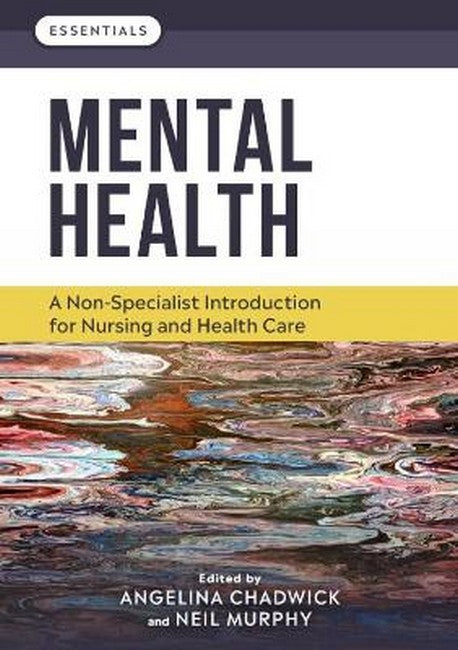Angelina is Lecturer in Mental Health Nursing a the University of Salford. She began her career as a general nurse in 1986, working in surgery. She later retrained as a mental health nurse and progressed into a variety of mental health nursing clinical and management roles within acute inpatient, older people and community practitioner areas. She moved into education as a training manager in an NHS Mental Health Trust, and then into higher education as a nurse lecturer in 2010. She is currently a module leader in the pre-registration degree nursing programme and teaches on both pre-registration and post graduate programmes. Her keen interest is around physical health in mental health. Angelina has published in a variety of nursing journals and textbooks. Neil started his career as a mental health practitioner in 1980. He trained as a mental health nurse and then as a behaviour therapist, working predominantly in a community role and latterly, in his active practice, working closely with families. Neil is Senior Lecturer in Mental Health Nursing at the University of Salford and has worked in Higher Education since 2002, leading and developing new programmes aimed at enhancing the quality of training offered to nurses and also to cognitive behaviour therapists and advanced clinical practitioners. Neil's main drive has been to equip as many people as possible in health care with mental health orientated skills in order to enhance care and foster client choice, empowerment and opportunity. His PhD focused on the influence of media representations on mental health practitioners and Neil has published in many nursing journals and textbooks. His publications include 'Experiences of ACP in training and the supervisors using a hub and spoke model' published in Practice Nursing.
Request Academic Copy
Please copy the ISBN for submitting review copy form
Description
About the authors; Abbreviations; Introduction 1. Mental health and wellbeing Angelina Chadwick and Lorna McGlynn 1.1 Introduction 1.2 Mental health and wellbeing 1.3 The relationship between mental health and physical health 1.4 Promoting mental health and wellbeing 2. Approaches to mental health Sean Welsh 2.1 Introduction 2.2 The biomedical approach to mental health 2.3 Behavioural approaches to mental health 2.4 Psychological approaches to mental health 2.5 Cognitive approaches to mental health 2.6 Psychodynamic approaches to mental health 2.7 Humanistic approaches to mental health 2.8 Psychosocial approaches to mental health 2.9 Trauma-informed approaches to mental health 3. Communicating, relating and providing support Elizabeth Tudor and Angelina Chadwick 3.1 Introduction 3.2 Communication skills 3.3 Core conditions 3.4 Therapeutic relationships / therapeutic alliance 3.5 Values and beliefs in practice 3.6 Person-centred and holistic care 3.7 Personal and professional boundaries 3.8 Patients transferred from a mental health setting 3.9 Challenging behaviour 4. Nursing and caring for individuals with mental health problems Elizabeth Burns, Emma Street, Shelly Allen and Lisa Bluff 4.1 Introduction 4.2 Anxiety 4.3 Obsessive-compulsive disorder 4.4 Post-traumatic stress disorder 4.5 Depression 4.6 Bipolar disorder 4.7 Psychosis 4.8 Schizophrenia 4.9 Self-harm 4.10 Suicidal feelings 4.11 Eating disorders 4.12 Mental health difficulties in pregnancy and beyond 4.13 Alcohol and drug use disorders 4.14 Personality disorders 5. Mental health in early life Celeste Foster and Eunice Ayodeji 5.1 Introduction 5.2 The link between child mental health and child development 5.3 Underlying principles of child mental health service provision in the UK 5.4 Understanding the legal framework for working with children and young people with mental health needs 5.5 Common mental health conditions in children and young people 5.6 Specialist child and adolescent mental health services (CAMHS) 5.7 Recognising signs of distress and responding helpfully 6. Mental health in adulthood Lorna McGlynn, Neil Murphy and Shelly Allen 6.1 Introduction 6.2 Interventions 6.3 Mental health services 6.4 Roles 7. Mental health in later life Rachel Price and Katie Davis 7.1 Introduction 7.2 The mental health of older people 7.3 Mental health conditions in older age 7.4 Self-harm and suicide in later life 7.5 Mental health assessment in later life 7.6 Therapeutic interventions in later life 7.7 Pharmacological interventions in later life 7.8 Mental health services for older people 8. Legal and ethical issues Will Hough and Elizabeth Garth 8.1 Introduction 8.2 Legal frameworks 8.3 Ethics 8.4 Ethical theories 9. Risk Neil Murphy 9.1 Introduction 9.2 Assessing risk 9.3 Considerations in assessing risk 9.4 Safeguarding 9.5 Boundaries 9.6 Mass media 9.7 Practicalities of the assessment of risk References; Index
'Accessible and thorough, and definitely well pitched for non-mental health clinicians.' Senior Lecturer, Mental Health Nursing 'From an adult nursing point of view it's got everything I would expect it to cover.' Adult nursing student A great book for all student healthcare professionals. 'As a student mental health nurse this book is a really good go-to book as it covers MH across the whole life span, ethical issues, MH legislation. I love how it explains what MH is. The book has tasks too to consolidate learning. This book would be fantastic for all Health care professionals in training and if you are a HCP in other fields. I would highly recommend it.' Amazon reviewer 'The book is very readable and accessible, I like the tone of the text as it is informative, and the activities give you chance to reflect...The information is comprehensive without being too wordy, but academically sound. This book should be on the reading list for all nursing students and other HCP students. It should also be on the book shelf in all nursing offices, [social worker] offices, occupational health etc.' Mental health nursing student 'I would definitely recommend this book to non-specialists. I like the breadth of areas that the book covers.' Senior Lecturer, Mental Health Nursing Excellent introductory text. 'Fantastic resource for all those working in health and social care. A must read for anyone whose job it is to care, with fantastic learning opportunities throughout.' Amazon reviewer

